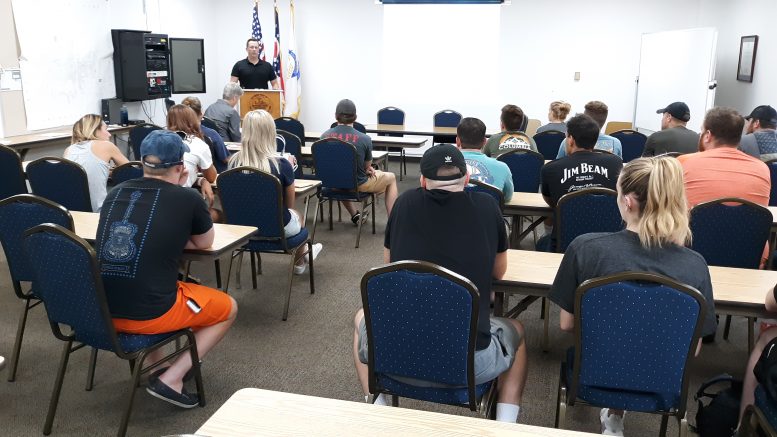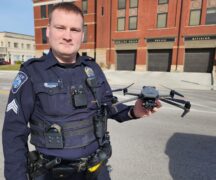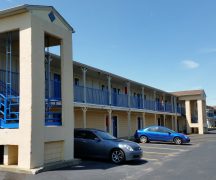By JAN LARSON McLAUGHLIN
BG Independent News
For years, Bowling Green Police Division has been training local bar employees how to spot fake IDs, and how to cut off patrons who have already had too much alcohol. Now the police are also teaching those employees how to handle customers who are discriminating against other patrons.
This new component to the Late Night Establishment Employee Training came about after the racially motivated attack of two patrons at Waffle House in Bowling Green earlier this year.
The first night of the newly expanded training was held at the police division last month. Attending were about 20 bouncers and bar staff from places like Ziggy’s, Campus Quarters, City Tap and 149 Bar.
The training to stop discriminatory behavior was created by the police division at the request of community members after two teenagers who stopped in the Waffle House late at night were called racist names and then assaulted by two white men.
“This was very damaging to the community,” Police Chief Tony Hetrick said, despite the fact that the two men charged with the crime do not live in Bowling Green. Members of La Conexion worked with the police department on the program to teach businesses how to better handle discriminatory incidents.
The training was added to the traditional liquor establishment training and opened up to all late-night businesses, since it was decided that these types of discriminatory acts often occur when people are intoxicated or when there are fewer people present at night.
Bowling Green Detective Scott Frank, who worked as a bouncer at bars when he went through college, explained to late night employees that they are responsible for preventing violence and discriminatory acts.
The city has an ordinance that defines discrimination as an act that denies any person the full enjoyment of goods, services, facilities, privileges, advantages and accommodations of any business or public accommodation.
Businesses need to have policies in place, and train their staff to implement those policies – prior to an incident occurring, Frank advised.
“Have some sort of plan. Make it well known you are not going to tolerate that kind of behavior,” he said.
“Pay attention to language, gestures, actions, behaviors,” Frank said. “Are they being threatening?”
The detective stressed that local businesses should call the police at the first hint of a problem.
“Don’t try to break up a fight,” he said. “Don’t get into it unless you have to.”
Instead – call for help, the bar staff and bouncers were told.

“Don’t ever hesitate to call the police,” Frank said, explaining the police would much rather arrive prior to a bottle being busted over someone’s head.
The police can arrest offenders, or order them to not return to the business.
“That’s your house,” and businesses don’t have to allow patrons with bad behavior, he said. Businesses that allow discriminatory incidents to occur, risk being fined $100 a day.
“Discrimination is not going to be tolerated – period,” Frank said.
“You are responsible for the patrons in your establishment,” he said. “You have options. You don’t have to turn a blind eye to it. You can’t go into it with the mindset that it will go away. You’ve got to stop it.”
Incidents of discrimination and bias reaching the level of hate crimes are rising in frequency, according to the FBI, which shows a 17 percent increase in 2017.
The training material advised that situations evolve quickly, so the best way to mitigate a hostile discrimination incident is to take action at first knowledge of the conduct. Try to de-escalate by talking. “Do not wait, the safety of your staff and patrons depends on not allowing an incident to become violent.”
“The best thing you can do for us is be a good witness,” by being able to give police a physical description and point them in the direction the offender went when leaving, Frank said.
The late night business training also covered alcohol issues.
Bowling Green has 22 carry outs, 39 restaurants with bars, and 21 downtown bars and restaurants.
“That’s a high volume of liquor in one area,” Frank said.
“Alcohol is a factor in a large number of crimes committed in Bowling Green,” he said. Often alcohol elevates the stupidity of crimes – such as the case of two intoxicated people fighting over who makes the best cookies.
Bar staff were warned to learn the signs so they don’t serve intoxicated patrons. The liability is on the establishment if the patron causes an accident after drinking too much.
“It’s going to be traced back to your bar,” Frank said. “It’s not worth the $3.25 sale.”
After warning the bouncers and bar staff about the images that would appear on the screen, Frank showed them photographs of a wrong-way crash in Toledo caused by an intoxicated driver that killed five members of one family.
He showed photos of people who died in Bowling Green after drinking too much. Two of them were killed after passing out on the train tracks through the city.
One student died after acute ethanol intoxication, with a BAC of 0.34. And one showed a videotape taken by some friends of a student snoring. They did not realize they were recording his last breaths as he died from too much alcohol.
In cases like these, there is backtracking by law enforcement.
“It will come back to the establishments. You will be held liable,” Frank said.
The bar staff and bouncers were given tips on how to recognize fake IDs. Though they are rushed and the lighting often isn’t great, there are some keys to spotting fakes – like peeled laminate on the driver’s license, and nervous patrons unable to answer questions about their birth date.
In addition to training bar and convenience store employees to recognize fake IDs, the police division also conducts compliance checks – to make sure the employees are not serving underage customers.
Last month, employees at three Bowling Green businesses sold alcohol to undercover underage buyers.
The training for late night businesses will be offered again by the police division.





